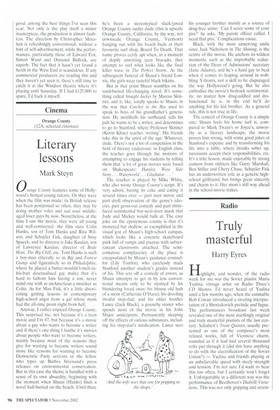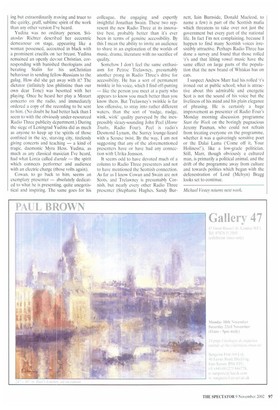Truly masterful
Harry Eyres
Highlight, and wonder, of the radio week for me was the Soviet pianist Maria Yudina, vintage artist on Radio Three's CD Masters. I'd never heard of Yudina until a few months ago, when the estimable Rob Cowan introduced a riveting interpretation of a Shostakovich prelude and fugue. The performances broadcast last week revealed one of the most startlingly original and truly masterful pianists of the last century. Schubert's Trout Quintet, usually presented as one of the composer's most relaxed works, full of Viennese charm, sounded as if it had had several thousand volts put through it (did this have anything to do with the electrification of the Soviet Union?) — Yudina and friends playing at an unbelievable speed with steely strength and tension. I'm not sure I'd want to hear this too often, but I certainly won't forget it. Unforgettable in a different way was the performance of Beethoven's Diabelli Variations. This was not only gripping and arrest
ing but extraordinarily moving and truer to the quirky, gruff, sublime spirit of the work than any other version I've heard.
Yudina was no ordinary person. Sviatoslav Richter described her eccentric demeanour on stage, appearing like a woman possessed, accoutred in black with a prominent crucifix on her breast. Yudina remained an openly devout Christian, corresponding with banished theologians and berating Stalin for his unChristian behaviour in sending fellow-Russians to the gulag. How did she get away with it? The dictator (infinitely less philistine than our own dear Tone) was besotted with her playing. Once he heard her play a Mozart concerto on the radio, and immediately ordered a copy of the recording to be sent to him, (No doubt he had better luck than I seem to with the obviously under-resourced Radio Three publicity department,) During the siege of Leningrad Yudina did as much as anyone to keep up the spirits of those confined in the icy, starving city, tirelessly giving concerts and teaching — a kind of tragic, daemonic Myra Hess. Yudina, as much as any classical musician I've heard, had what Lorca called duende — the spirit which connects performer and audience with an electric charge (those volts again).
Cowan, to go back to him, seems an exemplary presenter — absolutely dedicated to what he is presenting, quite unegotistical and inspiring. The same goes for his colleague, the engaging and expertly insightful Jonathan Swain. These two represent the new Radio Three at its innovative best, probably better than it's ever been in terms of genuine accessibility. By this I mean the ability to invite an audience to share in an exploration of the worlds of music, drama, literature with no sacrifice of quality.
Somehow I don't feel the same enthusiasm for Petroc Trelawney, presumably another prong in Radio Three's drive for accessibility. He has a sort of permanent twinkle in his voice, which I find off-putting — like the person you meet at a party who appears to know you much better than you know them, But Trelawney's twinkle is far less offensive, to stray into rather different waters, than the sort of 'nudge, nudge, wink, wink' quality purveyed by the inexpressibly sleazy-sounding John Peel (Home Truths, Radio Four). Peel is radio's Desmond Lynam, the Surrey lounge-lizard with a Scouse twist. By the way, I am not suggesting that any of the aforementioned presenters have or have had any connection with Ulrika Jonsson.
It seems odd to have devoted much of a column to Radio Three presenters and not to have mentioned the Scottish connection. As far as I know Cowan and Swain are not Scots, and Trelawney is presumably Cornish, but nearly every other Radio Three presenter (Stephanie Hughes, Sandy Bur
nett, lain Burnside, Donald Macleod, to name a few) is part of the Scottish mafia which threatens to take over not just the government but every part of the national life. In fact I'm not complaining. because I happen to find many Scottish voices irresistibly attractive. Perhaps Radio Three has done a survey and found that those rolled 'es and that lilting vowel music have the same effect on large parts of the population that the new brand of Whiskas has on cats.
I suspect Andrew Marr had his rolled 'r's ironed out at public school; what is attractive about this admirable and energetic Scot is not the sound of his voice but the liveliness of his mind and his plain elegance of phrasing. He is certainly a huge improvement as presenter of Radio Four's Monday morning discussion programme Start the Week on the boringly pugnacious Jeremy Paxman, who could not refrain from treating everyone on the programme, whether it was a quiveringly sensitive poet or the Dalai Lama ('Come off it, Your Holinessl'), like a low-grade politician. Still, Marr, though obviously a cultured man, is primarily a political animal, and the drift of the programme away from culture and towards politics which began with the defenestration of Lord (Melvyn) Bragg looks set to continue.
Michael Vestey returns next week.



















































































































 Previous page
Previous page